The Google Pixel C Review
by Brandon Chester & Joshua Ho on January 25, 2016 8:00 AM ESTBattery Life
When Apple unveiled the iPad, they promised that it would achieve 10 hour battery life. That has been something of a standard for tablets now, and for the most part we've seen that high end tablets end up meeting that goal, while mid range ones often end up falling short of it. 2015 was a bit of an exception to this in some ways, with many high end tablets also missing this goal by several hours in some cases. Due to the nature of tablets and how they're used, it's really difficult to recommend one if it doesn't achieve enough battery life to last you through the day with a normal workload.
To test the Pixel C's battery life I've attempted to run it through all of our battery tests. First up is our internal web browser test, followed by our video playback battery test.
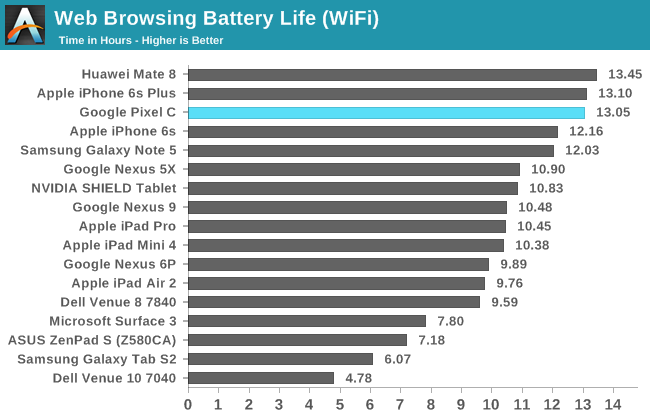
It's clear that Google's use of a LTPS display and a large battery pay off big time when you look at battery life. Even with the SoC staying on its higher-power A57 cores, the Pixel C manages to last for over 13 hours in our web browsing test. This puts it ahead of every other tablet on record, and by a large margin too.
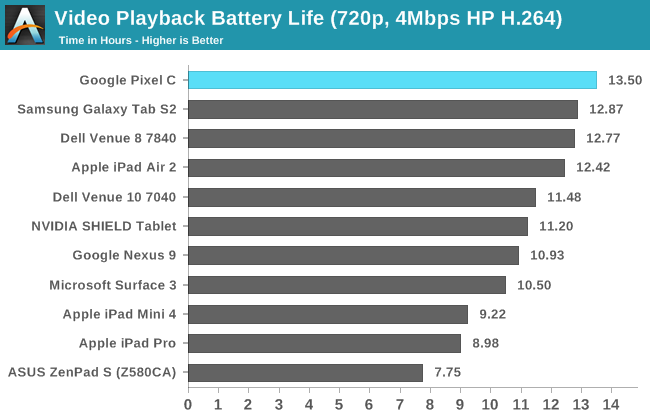
In video playback the Pixel C once again comes out on top. This is quite surprising, as normally AMOLED tablets perform best in this test due to their ability to turn off pixels when displaying black, as well as their general efficiencies with darker colors and shades. The gap between the Pixel C and the Tab S2 isn't insignificant either, so Google should be very happy with what they've achieved here.
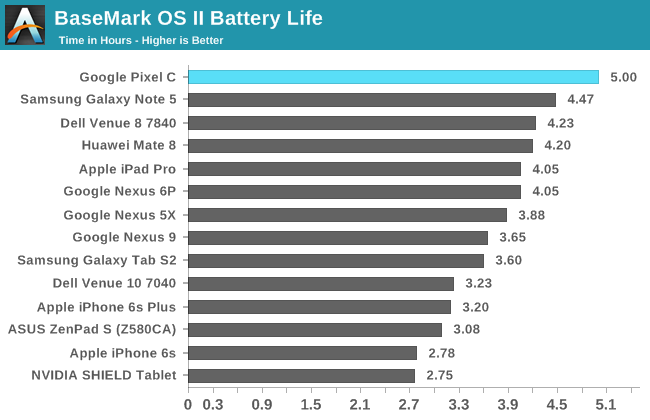
In BaseMark OS II's CPU-bound battery test we again see the Pixel C top the charts. This is really surprising to me, because on the SoC side we're looking at four Cortex A57 cores on a 20nm process. Again, Google's large battery and LTPS display help a great deal, but it's also clear that Tegra X1 isn't causing any significant problems for the Pixel C as far as power consumption goes.
At this point I would normally continue to run our PCMark and GFXBench battery tests. Unfortunately, the Pixel C's software makes it incapable of completing either of them. I made five attempts to complete PCMark, which took a great deal of time as the test runs over many hours. In all cases the tablet locked up during the test and required a hard reboot. It may be possible to eventually get it to complete, but I didn't feel that it was worth delaying the review further in the hopes that I could eventually get the Pixel C to complete the test properly.
As for GFXBench, it instantly stops due to it detecting that the tablet is plugged in. I believe this may relate to Google's system for inductive keyboard charging, but whatever the cause may be the result is that I can't get a battery result for GPU-bound workloads either. It's worth noting that the web test also required several runs before I could get it to complete the test without the tablet crashing, so that's something to think about as far as software stability and reliability goes.
In the end, what I have seen of the Pixel C's battery life leads me to believe that it's quite good, but we're definitely not looking at the entire picture here due to the missing data. I can say that in my experience it seemed to last a long time, so if I had to go out on a limb I would say that the combination of the low power LTPS display panel and a relatively large battery allow for very good battery life even with the CPU running on its A57 cores. Since Tegra X1 has a great deal of GPU power I really wish I could have gotten a GFXBench battery result, but there's not much that can be done there.
Charging
Since tablets usually offer enough battery life to get through the day, being able to charge them incredibly quickly becomes less of a need than with smartphones because you'll often end up only charging your tablet overnight. That being said, the immense charge time required by older tablets which required larger batteries to power their SoCs and displays meant that if your tablet battery did die you probably weren't going to get to use it until the next day. With modern tablets we've seen a push to reduce battery capacity, as well as the inclusion of 10-15W chargers to reduce charge times.
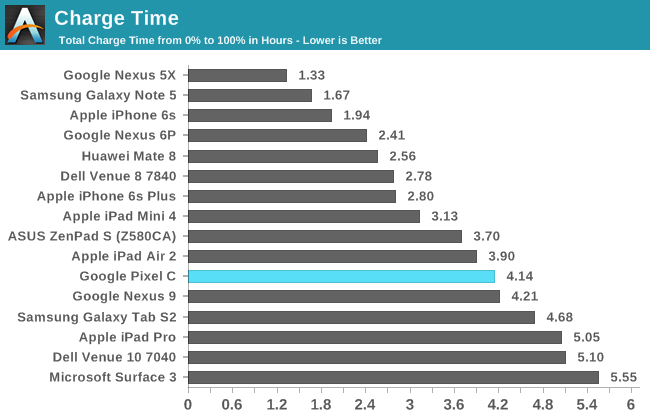
The Pixel C ships with a 15W charger with a USB Type-C connector. The cable is actually fixed to the block, so you can't use it as a normal Type-C to Type-C cable. On the bright side, Google has used a cable which is around four feet long, so you get some extra length compared to using the included cable in the box. As you can see in the graph above, the battery is charged at around 11W while fast charging, which lasts for three hours before trickle charging begins. Getting the remaining 10-15% ends up taking another hour, with the total charge time from 0% to 100% being 4.14 hours. Considering that the Pixel C packs a noticeably larger battery than the iPad Air 2, the roughly four hour charge time is actually quite a good result.


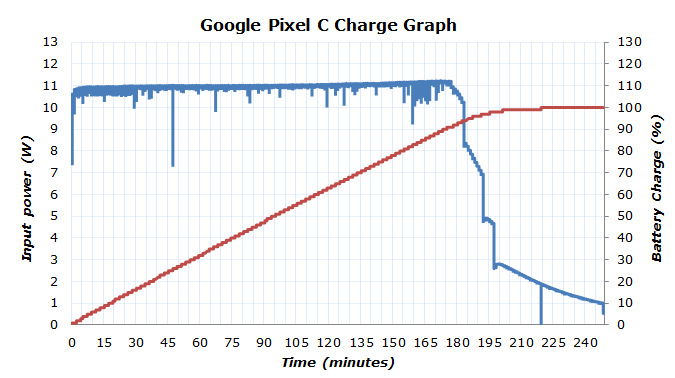








122 Comments
View All Comments
kurkosdr - Monday, January 25, 2016 - link
Split-screen is a problem devs aren't at fault, but Google.jbelkin - Monday, January 25, 2016 - link
Because android only sells when it's subsidized or discounted heavily. That is why android tablets sell fine at $99 but not beyond that. The facts are that android is only fit for low end products - look at Nest now, stops working periodically - an annoyance for a phone or a tablet but deadly when in cold climates when you need the temperature maintained ... but what does Google care* - as long as the tracking info arrives back, the rest - who cares? What, you want your "free" money back?* one reason why google is changing its name tio alphabet, non assiciation with google branding.
Speedfriend - Tuesday, January 26, 2016 - link
Android only fit for low end products? I use iOS and Android products on a daily basis and my Android phone is far more stable than my iPhone, many of my Android apps work better too. And don't get me start on iPhone reliability. The number of hours I have wasted in my life trying to get an iPhone repaired because the touchscreen or fingerprint reader has broken again. We use iPhone as our work phone and the reliability is awful compared to our laptops and PCs.vanilla_gorilla - Tuesday, January 26, 2016 - link
I've got right at 480 iOS devices registered in Air-Watch so my anecdote > your anecdote, and we don't have any of the problems you're describing. The only time an iPhone breaks is when someone drops it or the rash of iPhone 5 we had years ago with the battery issue (for which Apple had a replacement program).fastfreddy68 - Wednesday, March 29, 2017 - link
jbelkin I read your stupidity and cant hold back . Tablets dont sell much because the "niche" they had is gone. Phablets replaced it. Apple six plus is a direct result of the popularity of Samsungs NOTE 4 and f,,,, Android. The Google pixel isnt sold to the poor Rube it cost more then some Iphones.Obviously you are some FANBOY. I'll put my LG V20 up against your Iphone any day.People like Android because of the creativity it allows.
NFC and Waterproofing a direct result of Androids popularity. Claiming Android is only for the poor is so 5 years ago. Maybe instead of buying another Apple product you should buy a clue.!
extide - Monday, January 25, 2016 - link
While I agree the Asian desire for CORESSSSSSS is a bit off, I don't think it really has anything to do with it. Ultimately most people don't care what processor is in the tablet. They care is it slow/crappy? If not, its ok.The software ecosystem, on the other hand, is the big deal. Android is well known for not having many good tablet focused apps. That is a much bigger issue than the cpu and stuff. I mean obviously this thing has great build quality, that's not holding it back.
easp - Monday, January 25, 2016 - link
The lack of good Android tablet software is a problem, but the fact that the Android tablet and phone market is dominated by SoCs with too many cores and too little single-thread performance is a big problem.I don't think its fair to place blame solely at the feet of asian customers. Plenty of spec-obsessed western customers have taken the bait too.
The poor single core performance means that javascript web apps are slow, because Javascript engines are single threaded.
jbelkin - Monday, January 25, 2016 - link
it does matter. high spec high cost android tablets do not sell - just like $1,500 chromebooks or WIN PC's. The max price for an android tablet is $99 and $299 for a chromebook.johnnyzleong - Monday, January 25, 2016 - link
Wow,"The Google ecosystem is focused on ignorant third-world consumers that think more cores are somehow better than faster individual cores."
Holding a iPad makes you feel so good isn't it?
McDuncun - Tuesday, January 26, 2016 - link
That`s the problem man, the Apple Market is so heavily condensed... Not with rational people or a well rounded product line but with the smug bastardized self righteous fumes that all Apple owners exude from their well bleached orifices. Stigmas are there for a reason and yes I can be petty and still make a good argument.